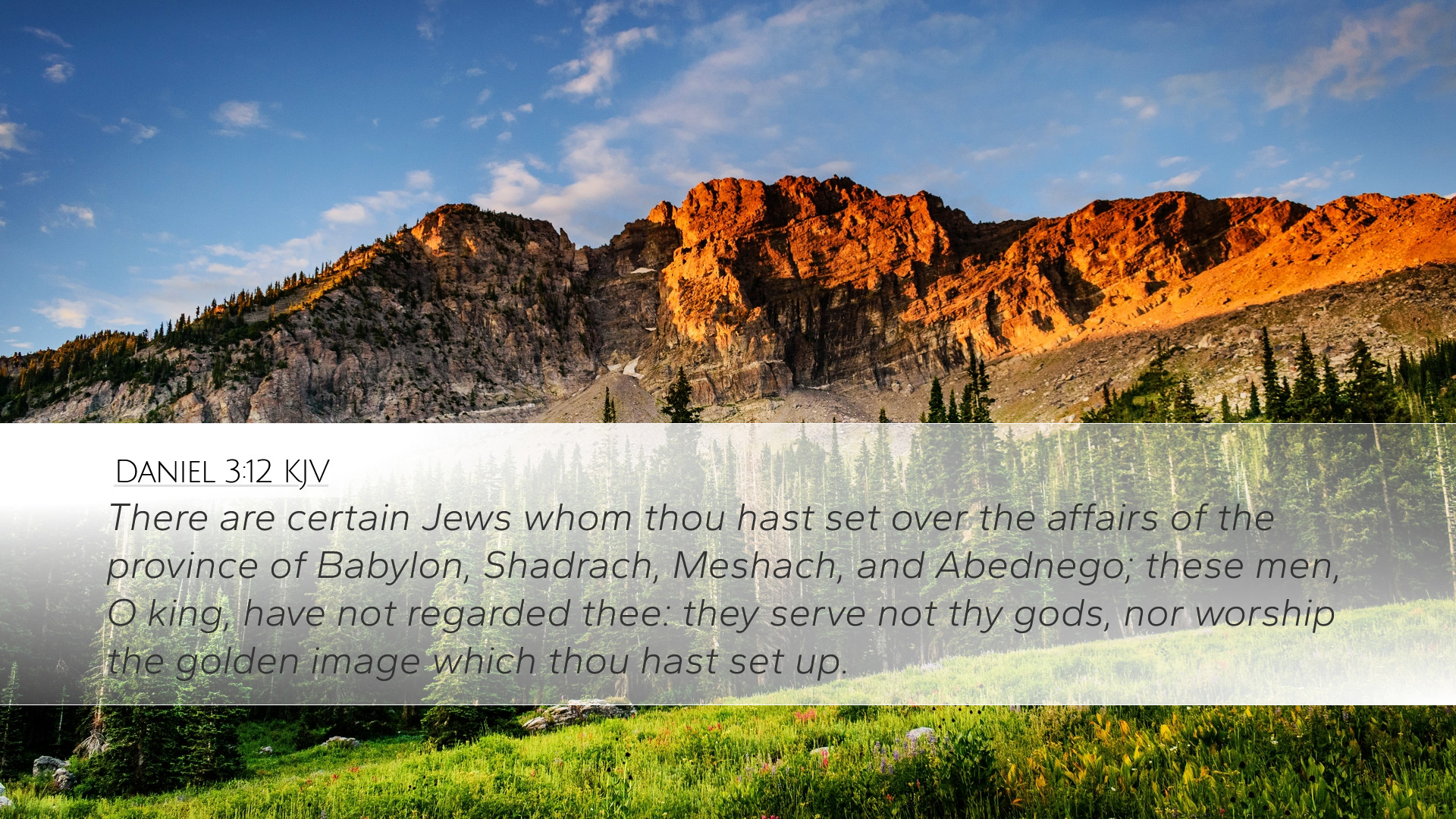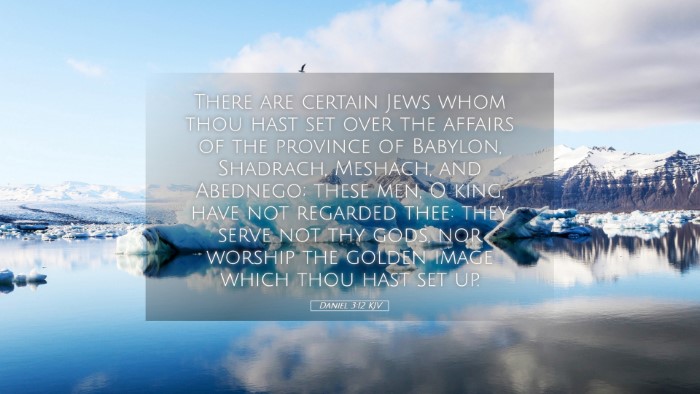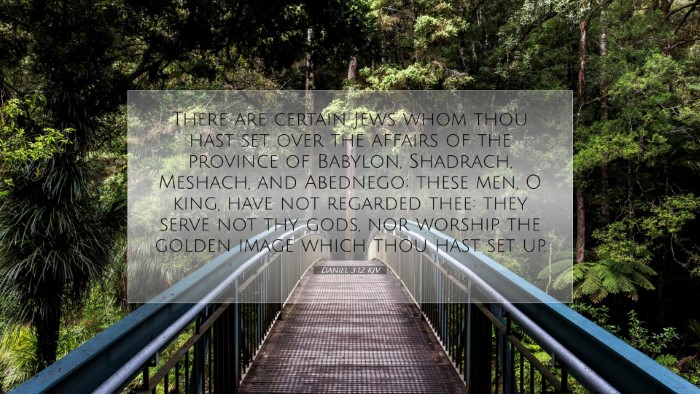Commentary on Daniel 3:12
Verse: Daniel 3:12 - "There are certain Jews whom thou hast set over the affairs of the province of Babylon, Shadrach, Meshach, and Abednego; these men, O king, have not regarded thee: they serve not thy gods, nor worship the golden image which thou hast set up."
This verse serves as a critical juncture in the Book of Daniel, illustrating the conflict between loyalty to God and obedience to earthly authority. The context is rooted in the challenge to worship and the consequences that follow. Various public domain commentaries provide valuable insights.
General Observations
This verse highlights the accusation brought against Shadrach, Meshach, and Abednego by their peers, addressing their defiance against King Nebuchadnezzar's decree to worship the golden image. It presents themes of faith, resistance, and divine fidelity in the face of oppression.
Matthew Henry's Commentary
Matthew Henry emphasizes the jealousy and malice that drove the Chaldeans to accuse the three young Jews. Their positions of authority incited envy, ultimately leading to their denunciation. Henry notes how those who walk uprightly often provoke envy in others, which can lead to unjust accusations.
- Faithfulness in Adversity: The refusal of Shadrach, Meshach, and Abednego to bow to the idol reflects their unwavering faith in God amidst a culture steeped in idolatry.
- Divine Sovereignty: Henry argues that their situation showcases the sovereign control of God over nations and kingdoms, highlighting that even in captivity, God remains in charge of the outcomes.
- Public vs. Private Worship: He also discusses the essence of worship—how it must come from the heart and cannot simply be a ritualistic duty performed under compulsion.
Albert Barnes' Commentary
Albert Barnes provides a detailed analysis of the actions of the accusers, noting the political machinations at play. He underscores the themes of loyalty and the societal pressures that compel individuals to conform to the majority.
- The Role of Authority: Barnes notes that while it is the king's command that requires compliance, the three men honor a higher authority—God Himself.
- Judgment by Society: He observes that the accusers, driven by ulterior motives, seek to undermine the faithful, suggesting a cautionary message for believers regarding the motivations of others.
- Resistance to Idolatry: Dairying from this, Barnes points out that every believer is called to resist the idols of their society, which can take many forms, including the pursuit of wealth, status, or power.
Adam Clarke's Commentary
Adam Clarke’s commentary dives into the historical and cultural context of Babylon at the time. Clarke discusses how the decree to worship the golden image aligned with the Babylonian understanding of loyalty and allegiance to the empire.
- Historical Context: Clarke highlights the significance of idolatry in Babylonian culture, illustrating how the golden image represented not only a religious dedication but also political loyalty.
- Individual Conviction vs. Collectivism: He reflects on the tension between individual conviction and the pressure to conform to collectivist norms of worship, drawing parallels to contemporary issues of faith under pressure.
- Encouragement for Modern Believers: Clarke encourages believers today to look to the examples of Shadrach, Meshach, and Abednego as models for standing firm in faith against societal expectations.
Theological Implications
This verse and the events surrounding it carry profound theological significance. It presents a real-world illustration of the ongoing struggle faced by believers when confronted with idolatry, whether physical or ideological.
- Faith's Perseverance: Shadrach, Meshach, and Abednego exemplify faith that perseveres even in the face of death, embodying Matthew 10:28, which speaks about fearing God rather than man.
- The Nature of True Worship: This account forces a reflection on what constitutes true worship, coming from obedience towards God rather than conformity to worldly standards.
- The Advocacy of God: The divergence of spiritual paths showcases that God will honor those who honor Him, a theme reiterated throughout scripture.
Practical Applications
For pastors, students, theologians, and scholars, Daniel 3:12 can serve as a foundational text for understanding the nature of fidelity to God in environments that promote compromise.
- Preparation for Trials: Believers are called to prepare their hearts and minds for potential trials of faith, emphasizing the need for deep-rooted conviction.
- Community Accountability: The events also suggest a communal role in supporting one another to resist temptation, fostering a culture of accountability among believers.
- Witness to the World: The faithful stance of these men can embolden others to witness God’s truth boldly, setting a powerful example in a secular world.
Conclusion
In conclusion, Daniel 3:12 stands as a testament to the conflict between divine allegiance and human authority. As believers reflect on this verse, they are reminded of their call to stand firm in faith, embodying the unwavering devotion exemplified by Shadrach, Meshach, and Abednego. Through the insights provided by the public domain commentaries, students and scholars can glean a deeper understanding of the implications of this text and its relevance in today’s world.


